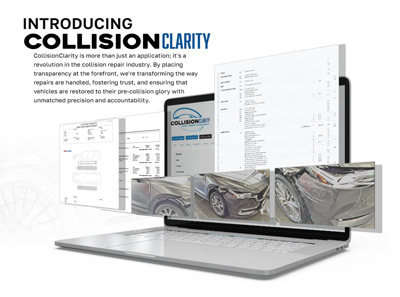The cloud-based software helps mitigate liability by clearly documenting a safe and proper repair.
DCR Systems is excited to announce the launch of CollisionClarity, a cloud-based software for the collision industry that can be used with any management or estimating software.
CollisionClarity displays all photos and documents related to a vehicle’s damage and required repairs in sequence with the line operation of the estimating software, so it’s easy to understand and trust. The entire package becomes a permanent electronic record for all stakeholders, including repairers, OEMs, insurers and customers.
“The software was designed to build trust through transparency by forcing an evidence storyboard of the damage and ultimately the repairs performed,” said Michael Giarrizzo, CEO of DCR Systems. “The complexity of vehicle systems has rapidly moved us to one way of proper and safe repairs. Those must be documented and accounted for. CollisionClarity is more than just an application. It’s the start of a revolution in the collision repair industry.”
Giarrizzo said the software helps mitigate liability by clearly documenting a safe and proper repair.
“That documentation will also help uphold a vehicle’s maximum value after an accident and maintain the auto manufacturer’s brand integrity by tracking the actual vehicle repairs,” he explained.
“In the ever-evolving landscape of collision repair, it is clear that the future is focused on OEM-driven repair procedures and will require transparency for all stakeholders,” said Cheryl Boswell, CFO at DCR Systems. “CollisionClarity fosters transparency and paves the way for a future where collision repair excellence is a shared commitment.”
Boswell said the software benefits all collision industry stakeholders, including repairers, insurers and OEMs by encouraging trust through the transparency of data.
Repairers
For repairers, Giarrizzo said embracing an OEM-driven repair and transparency is not just about staying relevant. It raises the bar for the entire industry by forcing a set of clear standards driven by the manufacturer.
“By aligning a shop’s practices with OEM guidelines and leveraging advanced diagnostics and repair technologies, facilities can deliver a level of quality and precision previously unattainable,” he said. “This not only enhances their reputation, but it also builds trust among customers, insurers and OEMs."
Insurers
Boswell said insurance companies also benefit from the shift to transparency.
“Accurate and well-documented repair processes will streamline claims, ultimately resulting in more efficient and cost-effective operations,” she said. “With a clear understanding of the repairs performed and why, insurers can reimburse shops for what is actually done and provide coverage based on the risk profile of each vehicle.”
OEMs
With the increasingly active role OEMs are taking in the repair process, Giarrizzo said a remarkable shift is occurring because of the collaboration between auto manufacturers and the collision repair ecosystem.
“Collaboration will help reduce conflict and lead the way toward a future where automotive excellence extends far past the production line and on to collision repair,” he said.
CollisionClarity was initially developed about three years ago as an internal tool to help the DCR Systems team better document repairs to settle claims more efficiently. The staff soon realized the tremendous benefits for the entire collision industry.
As the software evolved, DCR Systems added automation to help streamline the information captured. This includes OEM repair information, position statements, storage of photos and videos, and other pertinent details.
With more vehicles equipped with Advanced Driver-Assistance Systems (ADAS) features, Dave Martin, DCR System’s director of operations for Vehicle Systems, said it is becoming increasingly important to know they are repaired and calibrated correctly.
“With CollisionClarity, shops can store all the evidence and verification needed to support what has been done to a car in a visual and easy-to-understand way,” said Martin. “This provides a high degree of confidence to all parties that it was repaired accurately and going back on the road safely.”
Although there are some great operators in the industry, Martin said many shops are repairing vehicles the old-school way, where a technician takes an automobile into their bay and fixes it the way they think it should be repaired.
“For those repairing vehicles according to manufacturer guidelines, this is a revolutionary tool to demonstrate the difference their facility provides to the customer,” he said.
Martin said the variance in how vehicles are repaired from shop to shop has never been greater.
“The lack of clear evidence of what is needed, and ultimately what is performed in a repair, has made claims settlement difficult,” he said. “CollisionClarity aligns the evidence of the repair, making it more efficient for adjusters, customers and shops."
This results in a very transparent repair process and eliminates the rework of evidence being sent multiple times.
“For example, they don't have to hunt through 80 photos to find the three needed,” Martin explained. “Instead, an adjuster can quickly access the repair plan and the photos and evidence are associated with each line.”
The software is being tested with DCR Systems’ licensees and demoed for insurers and auto manufacturers.
“We believe CollisionClarity will change the industry and encourage all parties to be far more transparent. Everyone should understand exactly what has been done to the vehicle and why,” said Martin. “We want customers to have confidence that they are putting their families and friends back into vehicles that are being repaired correctly with all supported documentation.”
For more information, visit www.collision-clarity.com.










Abby Andrews